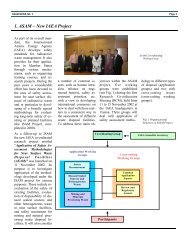- Page 5 and 6:
1. Nuclear Reactor Principles · 1
- Page 7:
1. Nuclear Reactor Principles Regio
- Page 10 and 11:
Table 1.2. Average cross sections f
- Page 13 and 14:
1. Nuclear Reactor Principles ❙ 7
- Page 15 and 16:
energy of the fuel nuclei. ❙ 9
- Page 17 and 18:
❙ 11 ❙ 1. Nuclear Reactor Princ
- Page 19 and 20:
❙ 13 ❙ 1. Nuclear Reactor Princ
- Page 21 and 22:
❙ 15 ❙ 1. Nuclear Reactor Princ
- Page 23 and 24:
1 Bq = 2.7x10 -5 µCi = 2.7x10 -8 m
- Page 25 and 26:
1.1.5. Natural radioactive series
- Page 27 and 28:
238 U 92+ 1 n0 -----> 135 Te 52 + 9
- Page 29 and 30:
❙ 23 ❙ 1. Nuclear Reactor Princ
- Page 31 and 32:
σ t = σ s + σ a = σ elastic +
- Page 33 and 34:
FIG. 1.10. And here in the 1keV to
- Page 35 and 36:
❙ 29 ❙ 1. Nuclear Reactor Princ
- Page 37 and 38:
❙ 31 ❙ 1. Nuclear Reactor Princ
- Page 39 and 40:
1.2.3.2. Neutron emission in fissio
- Page 41 and 42:
❙ 35 ❙ 1. Nuclear Reactor Princ
- Page 43 and 44:
Three possible states could then be
- Page 45 and 46:
TABLE 1.3. Slowing down efficiency
- Page 47 and 48:
1 UNGG/AGR CANDU PWR/BWR TABLE 1.5.
- Page 49 and 50:
❙ 43 ❙ 1. Nuclear Reactor Princ
- Page 51 and 52:
❙ 45 ❙ 1. Nuclear Reactor Princ
- Page 53 and 54:
❙ 47 ❙ 1. Nuclear Reactor Princ
- Page 55 and 56:
❙ 49 ❙ 1. Nuclear Reactor Princ
- Page 57 and 58:
❙ 51 ❙ 1. Nuclear Reactor Princ
- Page 59:
✼✼✼ REFERENCES ✼✼✼ ❙
- Page 63 and 64:
2.1. Introduction C O N T E N T S 2
- Page 65 and 66:
2. Radiation Protection 2.1. Introd
- Page 67 and 68:
2.2.1. Exposure ❙ 61 ❙ 2. Radia
- Page 69 and 70:
❙ 63 ❙ 2. Radiation Protection
- Page 71 and 72:
❙ 65 ❙ 2. Radiation Protection
- Page 73 and 74:
2.2.4. Effective dose ❙ 67 ❙ 2.
- Page 75 and 76:
❙ 69 ❙ 2. Radiation Protection
- Page 77 and 78:
❙ 71 ❙ 2. Radiation Protection
- Page 79 and 80:
❙ 73 ❙ 2. Radiation Protection
- Page 81 and 82:
❙ 75 ❙ 2. Radiation Protection
- Page 83 and 84:
schematically in Fig. (2.7). ❙ 77
- Page 85 and 86:
❙ 79 ❙ 2. Radiation Protection
- Page 87 and 88:
The great utility of the G‐M tube
- Page 89 and 90:
❙ 83 ❙ 2. Radiation Protection
- Page 91 and 92:
❙ 85 ❙ 2. Radiation Protection
- Page 93 and 94:
❙ 87 ❙ 2. Radiation Protection
- Page 95 and 96:
❙ 89 ❙ 2. Radiation Protection
- Page 97 and 98:
❙ 91 ❙ 2. Radiation Protection
- Page 99 and 100:
protection conditions. These factor
- Page 101 and 102:
2.6.2. Effects of dose, dose‐rate
- Page 103 and 104:
❙ 97 ❙ 2. Radiation Protection
- Page 105 and 106:
2.7. Principles of Radiological Pro
- Page 107 and 108:
❙ 101 ❙ 2. Radiation Protection
- Page 109 and 110:
❙ 103 ❙ 2. Radiation Protection
- Page 111 and 112:
❙ 105 ❙ 2. Radiation Protection
- Page 113 and 114:
❙ 107 ❙ 2. Radiation Protection
- Page 115 and 116:
❙ 109 ❙ 2. Radiation Protection
- Page 117 and 118:
❙ 111 ❙ 2. Radiation Protection
- Page 119 and 120:
❙ 113 ❙ 2. Radiation Protection
- Page 121 and 122:
❙ 115 ❙ N 0 = N 2 1 t / t 1/ 2
- Page 123 and 124:
ln 10 = μ t1/10 ≈ 3 · ln 2 = 3
- Page 125:
✼✼✼ REFERENCES ✼✼✼ ❙
- Page 129 and 130:
C O N T E N T S | Table of Contents
- Page 131:
Fig. 1 Committees for IAEA Safety S
- Page 134 and 135:
Regional Basic Professional Trainin
- Page 136 and 137:
Regional Basic Professional Trainin
- Page 138 and 139:
Regional Basic Professional Trainin
- Page 140 and 141:
Regional Basic Professional Trainin
- Page 142 and 143:
Regional Basic Professional Trainin
- Page 144 and 145:
Regional Basic Professional Trainin
- Page 146 and 147:
Regional Basic Professional Trainin
- Page 148 and 149:
Regional Basic Professional Trainin
- Page 150 and 151:
Regional Basic Professional Trainin
- Page 152 and 153:
Regional Basic Professional Trainin
- Page 154 and 155:
Regional Basic Professional Trainin
- Page 156 and 157:
Regional Basic Professional Trainin
- Page 158 and 159:
Regional Basic Professional Trainin
- Page 160 and 161:
Regional Basic Professional Trainin
- Page 162 and 163:
Regional Basic Professional Trainin
- Page 164 and 165:
Regional Basic Professional Trainin
- Page 166 and 167:
Regional Basic Professional Trainin
- Page 168 and 169:
Regional Basic Professional Trainin
- Page 170 and 171:
Regional Basic Professional Trainin
- Page 172 and 173:
Regional Basic Professional Trainin
- Page 174 and 175:
Regional Basic Professional Trainin
- Page 176 and 177:
Regional Basic Professional Trainin
- Page 178 and 179:
Regional Basic Professional Trainin
- Page 180 and 181:
Regional Basic Professional Trainin
- Page 182 and 183:
Regional Basic Professional Trainin
- Page 184 and 185:
Regional Basic Professional Trainin
- Page 186 and 187:
Regional Basic Professional Trainin
- Page 188 and 189:
Regional Basic Professional Trainin
- Page 190 and 191:
Regional Basic Professional Trainin
- Page 192 and 193:
Regional Basic Professional Trainin
- Page 194 and 195:
Regional Basic Professional Trainin
- Page 196 and 197:
Regional Basic Professional Trainin
- Page 198 and 199:
Regional Basic Professional Trainin
- Page 200 and 201:
Regional Basic Professional Trainin
- Page 202 and 203:
Regional Basic Professional Trainin
- Page 204 and 205:
Regional Basic Professional Trainin
- Page 206 and 207:
Regional Basic Professional Trainin
- Page 208 and 209:
Regional Basic Professional Trainin
- Page 210 and 211:
Regional Basic Professional Trainin
- Page 212 and 213:
Regional Basic Professional Trainin
- Page 214 and 215:
Regional Basic Professional Trainin
- Page 216 and 217:
Regional Basic Professional Trainin
- Page 218 and 219:
Regional Basic Professional Trainin
- Page 220 and 221:
Regional Basic Professional Trainin
- Page 222 and 223:
Regional Basic Professional Trainin
- Page 225 and 226:
C O N T E N T S | Table of Contents
- Page 227 and 228:
❙ 221 ❙ 4. DESIGN OF NUCLEAR RE
- Page 229 and 230:
4.1.1.2. The concept of defence in
- Page 231 and 232:
4.1.2. Requirements for management
- Page 233 and 234:
❙ 227 ❙ 4. DESIGN OF NUCLEAR RE
- Page 235 and 236:
❙ 229 ❙ 4. DESIGN OF NUCLEAR RE
- Page 237 and 238:
administrative control. ❙ 231 ❙
- Page 239 and 240:
❙ 233 ❙ 4. DESIGN OF NUCLEAR RE
- Page 241 and 242:
❙ 235 ❙ 4. DESIGN OF NUCLEAR RE
- Page 243 and 244:
Design basis accidents ❙ 237 ❙
- Page 245 and 246:
Single failure criterion ❙ 239
- Page 247 and 248:
❙ 241 ❙ 4. DESIGN OF NUCLEAR RE
- Page 249 and 250:
❙ 243 ❙ 4. DESIGN OF NUCLEAR RE
- Page 251 and 252:
Deterministic approach The determin
- Page 253 and 254:
accidents, with account taken of th
- Page 255 and 256:
Fuel elements and assemblies Fig. 4
- Page 257 and 258:
Reactor shutdown ❙ 251 ❙ 4. DES
- Page 259 and 260:
❙ 253 ❙ 4. DESIGN OF NUCLEAR RE
- Page 261 and 262:
❙ 255 ❙ 4. DESIGN OF NUCLEAR RE
- Page 263 and 264:
❙ 257 ❙ 4. DESIGN OF NUCLEAR RE
- Page 265 and 266:
functional in the event of a severe
- Page 267 and 268:
4.1.5.4. Instrumentation and contro
- Page 269 and 270:
❙ 263 ❙ 4. DESIGN OF NUCLEAR RE
- Page 271 and 272:
❙ 265 ❙ 4. DESIGN OF NUCLEAR RE
- Page 273 and 274:
❙ 267 ❙ 4. DESIGN OF NUCLEAR RE
- Page 275 and 276:
4.1.5.9. Radiation protection Gener
- Page 277 and 278:
❙ 271 ❙ 4. DESIGN OF NUCLEAR RE
- Page 279 and 280:
❙ 273 ❙ 4. DESIGN OF NUCLEAR RE
- Page 281 and 282:
❙ 275 ❙ 4. DESIGN OF NUCLEAR RE
- Page 283 and 284:
Operation at a power level < 1 MW.
- Page 285 and 286:
❙ 279 ❙ 4. DESIGN OF NUCLEAR RE
- Page 287 and 288:
of these exchangers, the water is c
- Page 289 and 290:
❙ 283 ❙ 4. DESIGN OF NUCLEAR RE
- Page 291 and 292:
❙ 285 ❙ 4. DESIGN OF NUCLEAR RE
- Page 293 and 294:
❙ 287 ❙ 4. DESIGN OF NUCLEAR RE
- Page 295 and 296:
❙ 289 ❙ 4. DESIGN OF NUCLEAR RE
- Page 297 and 298:
❙ 291 ❙ 4. DESIGN OF NUCLEAR RE
- Page 299 and 300:
Fig. 4.11. HANARO Core Pool Fig. 4.
- Page 301 and 302:
4.2.6.2.3 Reactor Systems ❙ 295
- Page 303 and 304:
❙ 297 ❙ 4. DESIGN OF NUCLEAR RE
- Page 305 and 306:
4.2.6.5. Neutron Activity Analysis
- Page 307 and 308:
❙ 301 ❙ 4. DESIGN OF NUCLEAR RE
- Page 309 and 310:
❏ physical separation. ❙ 303
- Page 311:
5. Siting Considerations Regional B
- Page 314 and 315:
5.4.2. Sources of risk 5.4.3. Evalu
- Page 316 and 317:
Regional Basic Professional Trainin
- Page 318 and 319:
Regional Basic Professional Trainin
- Page 320 and 321:
Regional Basic Professional Trainin
- Page 322 and 323:
Regional Basic Professional Trainin
- Page 324 and 325:
Regional Basic Professional Trainin
- Page 326 and 327:
Regional Basic Professional Trainin
- Page 328 and 329:
Regional Basic Professional Trainin
- Page 330 and 331:
Regional Basic Professional Trainin
- Page 332 and 333:
Regional Basic Professional Trainin
- Page 334 and 335:
Regional Basic Professional Trainin
- Page 336 and 337:
Regional Basic Professional Trainin
- Page 338 and 339:
Regional Basic Professional Trainin
- Page 340 and 341:
Regional Basic Professional Trainin
- Page 342 and 343:
Regional Basic Professional Trainin
- Page 344 and 345:
Regional Basic Professional Trainin
- Page 346 and 347:
Regional Basic Professional Trainin
- Page 348 and 349:
Regional Basic Professional Trainin
- Page 350 and 351:
Regional Basic Professional Trainin
- Page 352 and 353:
Regional Basic Professional Trainin
- Page 354 and 355:
Regional Basic Professional Trainin
- Page 356 and 357:
Regional Basic Professional Trainin
- Page 358 and 359:
Regional Basic Professional Trainin
- Page 360 and 361:
Regional Basic Professional Trainin
- Page 362 and 363:
Regional Basic Professional Trainin
- Page 365 and 366:
C O N T E N T S | Table of Contents
- Page 367 and 368:
6. Safety Classification Of Structu
- Page 369 and 370:
6. Safety Classification Of Structu
- Page 371 and 372:
Safety functions necessary to preve
- Page 373 and 374:
6. Safety Classification Of Structu
- Page 375 and 376:
6.1.3. Principal Safety Classes 6.
- Page 377 and 378:
6. Safety Classification Of Structu
- Page 379 and 380:
6. Safety Classification Of Structu
- Page 381 and 382:
6. Safety Classification Of Structu
- Page 383 and 384:
function; 6. Safety Classification
- Page 385 and 386:
6. Safety Classification Of Structu
- Page 387 and 388:
6. Safety Classification Of Structu
- Page 389 and 390:
the safety function would be requir
- Page 391 and 392:
6. Safety Classification Of Structu
- Page 393 and 394:
6. Safety Classification Of Structu
- Page 395 and 396:
6.3.2. Description of Quality Group
- Page 397 and 398:
6. Safety Classification Of Structu
- Page 399 and 400:
6. Safety Classification Of Structu
- Page 401 and 402:
6. Safety Classification Of Structu
- Page 403 and 404:
6. Safety Classification Of Structu
- Page 405 and 406:
6.4.3. Seismic category 1: 6.4.3.1.
- Page 407 and 408:
6. Safety Classification Of Structu
- Page 409 and 410:
6. Safety Classification Of Structu
- Page 411 and 412:
6. Safety Classification Of Structu
- Page 413:
7. Quality Assurance Regional Basic
- Page 416 and 417:
7.5.1. Manufacture Quality Assuranc
- Page 418 and 419:
Regional Basic Professional Trainin
- Page 420 and 421:
Regional Basic Professional Trainin
- Page 422 and 423:
Regional Basic Professional Trainin
- Page 424 and 425:
Regional Basic Professional Trainin
- Page 426 and 427:
Regional Basic Professional Trainin
- Page 428 and 429:
Regional Basic Professional Trainin
- Page 430 and 431:
Regional Basic Professional Trainin
- Page 432 and 433:
Regional Basic Professional Trainin
- Page 434 and 435:
Regional Basic Professional Trainin
- Page 436 and 437:
Regional Basic Professional Trainin
- Page 438 and 439:
Regional Basic Professional Trainin
- Page 440 and 441:
Regional Basic Professional Trainin
- Page 442 and 443:
Regional Basic Professional Trainin
- Page 444 and 445:
Regional Basic Professional Trainin
- Page 446 and 447:
Regional Basic Professional Trainin
- Page 448 and 449:
Regional Basic Professional Trainin
- Page 450 and 451:
Regional Basic Professional Trainin
- Page 452 and 453:
Regional Basic Professional Trainin
- Page 454 and 455:
Regional Basic Professional Trainin
- Page 456 and 457:
Regional Basic Professional Trainin
- Page 458 and 459:
Regional Basic Professional Trainin
- Page 460 and 461:
Regional Basic Professional Trainin
- Page 462 and 463:
Regional Basic Professional Trainin
- Page 464 and 465:
Regional Basic Professional Trainin
- Page 466 and 467:
Regional Basic Professional Trainin
- Page 468 and 469:
Regional Basic Professional Trainin
- Page 470 and 471:
Regional Basic Professional Trainin
- Page 472 and 473:
Regional Basic Professional Trainin
- Page 475 and 476:
C O N T E N T S 8.1. INTRODUCTION |
- Page 477 and 478:
❙ 471 ❙ 8-A. Deterministic Acci
- Page 479 and 480:
❙ 473 ❙ 8-A. Deterministic Acci
- Page 481 and 482:
❙ 475 ❙ 8-A. Deterministic Acci
- Page 483 and 484:
guidelines for this categorization.
- Page 485 and 486:
❙ 479 ❙ 8-A. Deterministic Acci
- Page 487 and 488:
❙ 481 ❙ 8-A. Deterministic Acci
- Page 489 and 490:
Table 8‐3 Typical Initial Conditi
- Page 491 and 492:
❙ 485 ❙ 8-A. Deterministic Acci
- Page 493 and 494:
❙ 487 ❙ 8-A. Deterministic Acci
- Page 495 and 496:
❙ 489 ❙ 8-A. Deterministic Acci
- Page 497 and 498:
8.5.3. Decrease in Reactor Coolant
- Page 499 and 500:
❙ 493 ❙ 8-A. Deterministic Acci
- Page 501 and 502:
or by operator error, often during
- Page 503 and 504:
❙ 497 ❙ 8-A. Deterministic Acci
- Page 505 and 506:
❙ 499 ❙ 8-A. Deterministic Acci
- Page 507 and 508:
❙ 501 ❙ 8-A. Deterministic Acci
- Page 509:
8-B. Deterministic Accident Analysi
- Page 512 and 513:
| List of Tables | Table 8.7‐1 Ru
- Page 515 and 516:
❙ 509 ❙ 8-B. Deterministic Acci
- Page 517 and 518:
❙ 511 ❙ 8-B. Deterministic Acci
- Page 519 and 520:
❙ 513 ❙ 8-B. Deterministic Acci
- Page 521 and 522:
SG Containment RCP RCP RCP SIT SIT
- Page 523 and 524:
❙ 517 ❙ 8-B. Deterministic Acci
- Page 525 and 526:
❙ 519 ❙ 8-B. Deterministic Acci
- Page 527 and 528:
8.2.5. Evaluation Model ❙ 521 ❙
- Page 529 and 530:
❙ 523 ❙ 8-B. Deterministic Acci
- Page 531 and 532:
❙ 525 ❙ 8-B. Deterministic Acci
- Page 533 and 534:
Figure 8.7‐7 Flow chart of KREM
- Page 535 and 536:
Cladding Temperature (K 1300 1200 1
- Page 537 and 538:
❙ 531 ❙ 8-B. Deterministic Acci
- Page 539 and 540:
❙ 533 ❙ 8-B. Deterministic Acci
- Page 541 and 542:
8.8.1.6. Loop Seal Formation and Cl
- Page 543 and 544:
❙ 537 ❙ 8-B. Deterministic Acci
- Page 545 and 546:
to ECCS injection time using CEFLAS
- Page 547 and 548:
❙ 541 ❙ 8-B. Deterministic Acci
- Page 549 and 550:
Table 8.8‐2 SBLOCA Break Spectrum
- Page 551 and 552:
F TEMPERATURE, o 0 100 200 300 400
- Page 553 and 554:
❙ 547 ❙ 8-B. Deterministic Acci
- Page 555 and 556:
8.8.2.2.3 RELAP5‐sEM Methodology
- Page 557 and 558:
❙ 551 ❙ 8-B. Deterministic Acci
- Page 559 and 560:
❙ 553 ❙ 8-B. Deterministic Acci
- Page 561:
9. Probabilistic Safety Analysis Re
- Page 564 and 565:
9.4. LEVEL 2 PSA 9.4.1. Objectives
- Page 566 and 567:
Regional Basic Professional Trainin
- Page 568 and 569:
Regional Basic Professional Trainin
- Page 570 and 571:
Regional Basic Professional Trainin
- Page 572 and 573:
Regional Basic Professional Trainin
- Page 574 and 575:
Regional Basic Professional Trainin
- Page 576 and 577:
Regional Basic Professional Trainin
- Page 578 and 579:
Regional Basic Professional Trainin
- Page 580 and 581:
Regional Basic Professional Trainin
- Page 582 and 583:
Regional Basic Professional Trainin
- Page 584 and 585:
Regional Basic Professional Trainin
- Page 586 and 587:
Regional Basic Professional Trainin
- Page 588 and 589:
Regional Basic Professional Trainin
- Page 590 and 591:
Regional Basic Professional Trainin
- Page 592 and 593:
Regional Basic Professional Trainin
- Page 594 and 595:
Regional Basic Professional Trainin
- Page 596 and 597:
Regional Basic Professional Trainin
- Page 598 and 599:
Regional Basic Professional Trainin
- Page 600 and 601:
Regional Basic Professional Trainin
- Page 602 and 603:
Regional Basic Professional Trainin
- Page 604 and 605:
Regional Basic Professional Trainin
- Page 606 and 607:
Regional Basic Professional Trainin
- Page 608 and 609:
Regional Basic Professional Trainin
- Page 610 and 611:
Regional Basic Professional Trainin
- Page 612 and 613:
Regional Basic Professional Trainin
- Page 614 and 615:
Regional Basic Professional Trainin
- Page 616 and 617:
Regional Basic Professional Trainin
- Page 618 and 619:
Regional Basic Professional Trainin
- Page 620 and 621:
Regional Basic Professional Trainin
- Page 622 and 623:
Regional Basic Professional Trainin
- Page 624 and 625:
Regional Basic Professional Trainin
- Page 626 and 627:
Regional Basic Professional Trainin
- Page 628 and 629:
Regional Basic Professional Trainin
- Page 631 and 632:
C O N T E N T S | Table of Contents
- Page 633 and 634:
❙ 627 ❙ 10-A. Limiting Conditio
- Page 635 and 636:
performance, correct set points, an
- Page 637 and 638:
❙ 631 ❙ 10-A. Limiting Conditio
- Page 639 and 640:
injecting borated water into the pr
- Page 641 and 642:
❙ 635 ❙ 10-A. Limiting Conditio
- Page 643 and 644:
❙ 637 ❙ 10-A. Limiting Conditio
- Page 645 and 646:
❙ 639 ❙ 10-A. Limiting Conditio
- Page 647 and 648:
Positive reactivity insertion rates
- Page 649 and 650:
❙ 643 ❙ 10-A. Limiting Conditio
- Page 651 and 652:
❙ 645 ❙ 10-A. Limiting Conditio
- Page 653 and 654:
❙ 647 ❙ 10-A. Limiting Conditio
- Page 655 and 656:
❙ 649 ❙ 10-A. Limiting Conditio
- Page 657 and 658:
❙ 651 ❙ 10-A. Limiting Conditio
- Page 659 and 660:
❙ 653 ❙ 10-A. Limiting Conditio
- Page 661 and 662:
10.4.3.3. Canadian type NPP ❙ 655
- Page 663 and 664:
❙ 657 ❙ 10-A. Limiting Conditio
- Page 665 and 666:
❙ 659 ❙ 10-A. Limiting Conditio
- Page 667 and 668: 2) Safety Limits and Safety System
- Page 669 and 670: the technical specifications is not
- Page 671 and 672: ❙ 665 ❙ 10-A. Limiting Conditio
- Page 673: 10-B. Technical Specifications for
- Page 677 and 678: 10-B. Technical Specifications for
- Page 679 and 680: 10-B. Technical Specifications for
- Page 681 and 682: 10-B. Technical Specifications for
- Page 683 and 684: 10-B. Technical Specifications for
- Page 685 and 686: 10-B. Technical Specifications for
- Page 687 and 688: 10.7.7.1. Monitoring Systems 10-B.
- Page 689 and 690: 10-B. Technical Specifications for
- Page 691 and 692: 10.8.1. Reactor Core Parameters 10-
- Page 693 and 694: 10.8.6. Emergency Power 10-B. Techn
- Page 695 and 696: 10-B. Technical Specifications for
- Page 697 and 698: 10-B. Technical Specifications for
- Page 699 and 700: authorized by responsible authority
- Page 701 and 702: 10-B. Technical Specifications for
- Page 703: 11. Human Performance: A Perspectiv
- Page 706 and 707: Figure 11.1 Model of violation Figu
- Page 708 and 709: Regional Basic Professional Trainin
- Page 710 and 711: Regional Basic Professional Trainin
- Page 712 and 713: Regional Basic Professional Trainin
- Page 714 and 715: Regional Basic Professional Trainin
- Page 716 and 717: Regional Basic Professional Trainin
- Page 720 and 721: Regional Basic Professional Trainin
- Page 722 and 723: Regional Basic Professional Trainin
- Page 724 and 725: Regional Basic Professional Trainin
- Page 726 and 727: Regional Basic Professional Trainin
- Page 728 and 729: Regional Basic Professional Trainin
- Page 730 and 731: Regional Basic Professional Trainin
- Page 732 and 733: Regional Basic Professional Trainin
- Page 734 and 735: Regional Basic Professional Trainin
- Page 736 and 737: Regional Basic Professional Trainin
- Page 738 and 739: Regional Basic Professional Trainin
- Page 740 and 741: Regional Basic Professional Trainin
- Page 742 and 743: Regional Basic Professional Trainin
- Page 744 and 745: Regional Basic Professional Trainin
- Page 746 and 747: Regional Basic Professional Trainin
- Page 749: 12. Surveillance Programmes Regiona
- Page 752 and 753: 12.4. IMPLEMENTATION 12.4.1. Genera
- Page 754 and 755: Regional Basic Professional Trainin
- Page 756 and 757: Regional Basic Professional Trainin
- Page 758 and 759: Regional Basic Professional Trainin
- Page 760 and 761: Regional Basic Professional Trainin
- Page 762 and 763: Regional Basic Professional Trainin
- Page 764 and 765: Regional Basic Professional Trainin
- Page 766 and 767: Regional Basic Professional Trainin
- Page 768 and 769:
Regional Basic Professional Trainin
- Page 770 and 771:
Regional Basic Professional Trainin
- Page 772 and 773:
Regional Basic Professional Trainin
- Page 774 and 775:
Regional Basic Professional Trainin
- Page 776 and 777:
Regional Basic Professional Trainin
- Page 778 and 779:
Regional Basic Professional Trainin
- Page 780 and 781:
Regional Basic Professional Trainin
- Page 782 and 783:
Regional Basic Professional Trainin
- Page 784 and 785:
Regional Basic Professional Trainin
- Page 786 and 787:
Regional Basic Professional Trainin
- Page 788 and 789:
Regional Basic Professional Trainin
- Page 790 and 791:
Regional Basic Professional Trainin
- Page 792 and 793:
Regional Basic Professional Trainin
- Page 794 and 795:
Regional Basic Professional Trainin
- Page 796 and 797:
Regional Basic Professional Trainin
- Page 798 and 799:
Regional Basic Professional Trainin
- Page 801:
13.Maintenance Management in KHNP R
- Page 805 and 806:
❙ 799 ❙ 13.Maintenance Manageme
- Page 807 and 808:
❙ 801 ❙ 13.Maintenance Manageme
- Page 809 and 810:
❙ 803 ❙ 13.Maintenance Manageme
- Page 811 and 812:
❙ 805 ❙ 13.Maintenance Manageme
- Page 813 and 814:
❙ 807 ❙ 13.Maintenance Manageme
- Page 815 and 816:
❙ 809 ❙ 13.Maintenance Manageme
- Page 817 and 818:
❙ 811 ❙ 13.Maintenance Manageme
- Page 819 and 820:
❙ 813 ❙ 13.Maintenance Manageme
- Page 821 and 822:
❙ 815 ❙ 13.Maintenance Manageme
- Page 823 and 824:
❙ 817 ❙ 13.Maintenance Manageme
- Page 825 and 826:
❙ 819 ❙ 13.Maintenance Manageme
- Page 827 and 828:
❙ 821 ❙ 13.Maintenance Manageme
- Page 829:
❙ 823 ❙ 13.Maintenance Manageme
- Page 833 and 834:
C O N T E N T S | Table of Contents
- Page 835 and 836:
15. Operational Safety 15.1. IAEA S
- Page 837 and 838:
❙ 831 ❙ 15. Operational Safety
- Page 839 and 840:
❙ 833 ❙ 15. Operational Safety
- Page 841 and 842:
❙ 835 ❙ 15. Operational Safety
- Page 843 and 844:
and modified if required. ❙ 837
- Page 845 and 846:
❙ 839 ❙ 15. Operational Safety
- Page 847 and 848:
❙ 841 ❙ 15. Operational Safety
- Page 849 and 850:
❙ 843 ❙ 15. Operational Safety
- Page 851 and 852:
❙ 845 ❙ 15. Operational Safety
- Page 853 and 854:
15.2.2. Organization and functions
- Page 855 and 856:
− Temporary and permanent plant m
- Page 857 and 858:
❙ 851 ❙ 15. Operational Safety
- Page 859 and 860:
Operating procedures and instructio
- Page 861 and 862:
❙ 855 ❙ 15. Operational Safety
- Page 863 and 864:
Off‐normal conditions are easily
- Page 865 and 866:
15.2.6. Work authorizations ❙ 859
- Page 867 and 868:
conventional hazards at the point o
- Page 869 and 870:
15.2.7. Accident management ❙ 863
- Page 871 and 872:
❙ 865 ❙ 15. Operational Safety
- Page 873 and 874:
❙ 867 ❙ 15. Operational Safety
- Page 875 and 876:
commissioning process. ❙ 869 ❙
- Page 877 and 878:
Event reports and root cause analyz
- Page 879 and 880:
Material regarding evaluation of ex
- Page 881 and 882:
❙ 875 ❙ 15. Operational Safety
- Page 883 and 884:
❙ 877 ❙ 15. Operational Safety
- Page 885 and 886:
❙ 879 ❙ 15. Operational Safety
- Page 887 and 888:
❙ 881 ❙ 15. Operational Safety
- Page 889 and 890:
Monitoring of initiatives in progre
- Page 891 and 892:
❙ 885 ❙ 15. Operational Safety
- Page 893:
❙ 887 ❙ 15. Operational Safety
- Page 897 and 898:
C O N T E N T S | Table of Contents
- Page 899 and 900:
16. In‐Plant Accident Management
- Page 901 and 902:
❙ 895 ❙ 16. In‐Plant Accident
- Page 903 and 904:
❙ 897 ❙ 16. In‐Plant Accident
- Page 905 and 906:
16.2.2. Safety Functions ❙ 899
- Page 907 and 908:
is to place the plant in a safe, st
- Page 909 and 910:
each a final stable and controlled
- Page 911 and 912:
❙ 905 ❙ 16. In‐Plant Accident
- Page 913 and 914:
❙ 907 ❙ 16. In‐Plant Accident
- Page 915 and 916:
❙ 909 ❙ 16. In‐Plant Accident
- Page 917 and 918:
❙ 911 ❙ 16. In‐Plant Accident
- Page 919 and 920:
16.3.5. Review of Korean SAMG by KI
- Page 921 and 922:
❙ 915 ❙ 16. In‐Plant Accident
- Page 923 and 924:
❙ 917 ❙ 16. In‐Plant Accident
- Page 925 and 926:
❙ 919 ❙ 16. In‐Plant Accident
- Page 927 and 928:
❙ 921 ❙ 16. In‐Plant Accident
- Page 929 and 930:
this stage. Control rod degradation
- Page 931 and 932:
❙ 925 ❙ 16. In‐Plant Accident
- Page 933 and 934:
❙ 927 ❙ 16. In‐Plant Accident
- Page 935 and 936:
❙ 929 ❙ 16. In‐Plant Accident
- Page 937 and 938:
Pressurization of the containment
- Page 939 and 940:
❙ 933 ❙ 16. In‐Plant Accident
- Page 941 and 942:
❙ 935 ❙ 16. In‐Plant Accident
- Page 943 and 944:
❙ 937 ❙ 16. In‐Plant Accident
- Page 945 and 946:
❙ 939 ❙ 16. In‐Plant Accident
- Page 947 and 948:
❙ 941 ❙ 16. In‐Plant Accident
- Page 949 and 950:
❙ 943 ❙ 16. In‐Plant Accident
- Page 951 and 952:
Fractional Relase Fractional Relase
- Page 953:
✼✼✼ REFERENCES ✼✼✼ ❙
- Page 957:
C O N T E N T S | Table of Contents
- Page 960 and 961:
Regional Basic Professional Trainin
- Page 962 and 963:
Regional Basic Professional Trainin
- Page 964 and 965:
Regional Basic Professional Trainin
- Page 966 and 967:
Regional Basic Professional Trainin
- Page 968 and 969:
Regional Basic Professional Trainin
- Page 970 and 971:
Regional Basic Professional Trainin
- Page 973:
19. Decommissioning Regional Basic
- Page 976 and 977:
| List of Tables | Table 1. Stages
- Page 978 and 979:
Regional Basic Professional Trainin
- Page 980 and 981:
Regional Basic Professional Trainin
- Page 982 and 983:
Regional Basic Professional Trainin
- Page 984 and 985:
Regional Basic Professional Trainin
- Page 986 and 987:
Regional Basic Professional Trainin
- Page 988 and 989:
Regional Basic Professional Trainin
- Page 990 and 991:
Regional Basic Professional Trainin
- Page 992 and 993:
Regional Basic Professional Trainin
- Page 994 and 995:
Regional Basic Professional Trainin
- Page 996 and 997:
Regional Basic Professional Trainin
- Page 998 and 999:
Regional Basic Professional Trainin
- Page 1000 and 1001:
Regional Basic Professional Trainin
- Page 1002 and 1003:
Regional Basic Professional Trainin
- Page 1004 and 1005:
Regional Basic Professional Trainin
- Page 1006 and 1007:
Regional Basic Professional Trainin
- Page 1008 and 1009:
Regional Basic Professional Trainin
- Page 1010 and 1011:
Regional Basic Professional Trainin
- Page 1012 and 1013:
Regional Basic Professional Trainin
- Page 1014 and 1015:
Regional Basic Professional Trainin
- Page 1016 and 1017:
Regional Basic Professional Trainin
- Page 1019:
20.1. Introduction C O N T E N T S
- Page 1022 and 1023:
Regional Basic Professional Trainin
- Page 1024 and 1025:
Regional Basic Professional Trainin
- Page 1026 and 1027:
Regional Basic Professional Trainin
- Page 1028 and 1029:
Regional Basic Professional Trainin
- Page 1030 and 1031:
Regional Basic Professional Trainin
- Page 1032 and 1033:
Regional Basic Professional Trainin
- Page 1034 and 1035:
Regional Basic Professional Trainin
- Page 1036 and 1037:
Regional Basic Professional Trainin
- Page 1038 and 1039:
Regional Basic Professional Trainin
- Page 1040 and 1041:
Regional Basic Professional Trainin
- Page 1042 and 1043:
Regional Basic Professional Trainin
- Page 1044 and 1045:
Regional Basic Professional Trainin
- Page 1046 and 1047:
Regional Basic Professional Trainin
- Page 1048 and 1049:
Regional Basic Professional Trainin
- Page 1050 and 1051:
Regional Basic Professional Trainin
- Page 1052 and 1053:
Regional Basic Professional Trainin
- Page 1054 and 1055:
Regional Basic Professional Trainin
- Page 1057:
21. Safety Culture Regional Basic P
- Page 1061 and 1062:
21. Safety Culture 21.1. DEFINITION
- Page 1063 and 1064:
FIG. 21.1. Basic elements of safety
- Page 1065 and 1066:
❙ 1059 ❙ 21. Safety Culture Ult
- Page 1067 and 1068:
Obtaining useful information from o
- Page 1069 and 1070:
terms of what they do. There is an
- Page 1071 and 1072:
Consequently, people also understan
- Page 1073 and 1074:
❙ 1067 ❙ 21. Safety Culture 21.
- Page 1075 and 1076:
❙ 1069 ❙ 21. Safety Culture 21.
- Page 1077 and 1078:
organization e.g. contractors. ❙
- Page 1079 and 1080:
❙ 1073 ❙ 21. Safety Culture opp
- Page 1081 and 1082:
❙ 1075 ❙ 21. Safety Culture Pri
- Page 1083 and 1084:
❙ 1077 ❙ 21. Safety Culture cou
- Page 1085 and 1086:
❙ 1079 ❙ 21. Safety Culture All
- Page 1087 and 1088:
21.4. MANAGEMENT OF SAFETY 21.4.1.
- Page 1089 and 1090:
subdivided in 4 sub‐objectives, w
- Page 1091 and 1092:
❙ 1085 ❙ 21. Safety Culture pro
- Page 1093 and 1094:
21.4.4. Specific safety management
- Page 1095 and 1096:
21.4.4.5. Self assessment ❙ 1089
- Page 1097:
❙ 1091 ❙ 21. Safety Culture as
- Page 1101:
C O N T E N T S | Table of Contents
- Page 1104 and 1105:
Regional Basic Professional Trainin
- Page 1106 and 1107:
Regional Basic Professional Trainin
- Page 1108 and 1109:
Regional Basic Professional Trainin
- Page 1110 and 1111:
Regional Basic Professional Trainin
- Page 1112 and 1113:
Regional Basic Professional Trainin
- Page 1114 and 1115:
Regional Basic Professional Trainin
- Page 1116 and 1117:
Regional Basic Professional Trainin
- Page 1118 and 1119:
Regional Basic Professional Trainin
- Page 1121:
AtomCARE Regional Basic Professiona
- Page 1125 and 1126:
AtomCARE 1. OVERVIEW OF NATIONAL RA
- Page 1127 and 1128:
❙ 1121 ❙ AtomCARE The RETAC of
- Page 1129 and 1130:
❙ 1123 ❙ AtomCARE secondary rad
- Page 1131 and 1132:
❙ 1125 ❙ AtomCARE actions by pr
- Page 1133 and 1134:
2.1.4. Component Modules (Configura
- Page 1135 and 1136:
Classification Major Functions Tech
- Page 1137 and 1138:
❙ 1131 ❙ AtomCARE containment b
- Page 1139 and 1140:
❙ 1133 ❙ AtomCARE b) Monitors a
- Page 1141 and 1142:
a) Calculates the distribution of t
- Page 1143 and 1144:
❙ 1137 ❙ AtomCARE telephone or
- Page 1145:
Introduction Of e‐FAST and Exerci
- Page 1148 and 1149:
| List of Figures | Fig. 1.1 Schema
- Page 1150 and 1151:
Regional Basic Professional Trainin
- Page 1152 and 1153:
Regional Basic Professional Trainin
- Page 1154 and 1155:
Regional Basic Professional Trainin
- Page 1156 and 1157:
Regional Basic Professional Trainin
- Page 1158 and 1159:
Regional Basic Professional Trainin
- Page 1160 and 1161:
Regional Basic Professional Trainin
- Page 1162 and 1163:
Regional Basic Professional Trainin
- Page 1164 and 1165:
Regional Basic Professional Trainin
- Page 1166 and 1167:
Regional Basic Professional Trainin
- Page 1168 and 1169:
Regional Basic Professional Trainin
- Page 1170 and 1171:
Regional Basic Professional Trainin
- Page 1172 and 1173:
Regional Basic Professional Trainin
- Page 1174 and 1175:
Regional Basic Professional Trainin
- Page 1176 and 1177:
Regional Basic Professional Trainin
- Page 1178 and 1179:
Regional Basic Professional Trainin
- Page 1180 and 1181:
Regional Basic Professional Trainin
- Page 1182 and 1183:
Regional Basic Professional Trainin
- Page 1185 and 1186:
C O N T E N T S 1.1. OVERVIEW OF TH
- Page 1187 and 1188:
❙ 1181 ❙ Nuclear Safety Informa
- Page 1189 and 1190:
❙ 1183 ❙ Nuclear Safety Informa
- Page 1191 and 1192:
❙ 1185 ❙ Nuclear Safety Informa
- Page 1193 and 1194:
❙ 1187 ❙ Nuclear Safety Informa
- Page 1195 and 1196:
❙ 1189 ❙ Nuclear Safety Informa
- Page 1197 and 1198:
❙ 1191 ❙ Nuclear Safety Informa
- Page 1199:
❙ 1193 ❙ Nuclear Safety Informa
- Page 1203:
1. Overview of OPiS C O N T E N T S
- Page 1206 and 1207:
Regional Basic Professional Trainin
- Page 1208 and 1209:
Regional Basic Professional Trainin
- Page 1210 and 1211:
Regional Basic Professional Trainin
- Page 1212 and 1213:
Regional Basic Professional Trainin
- Page 1214 and 1215:
Regional Basic Professional Trainin
- Page 1216 and 1217:
Regional Basic Professional Trainin
- Page 1220:
Regional Basic Professional Trainin
















